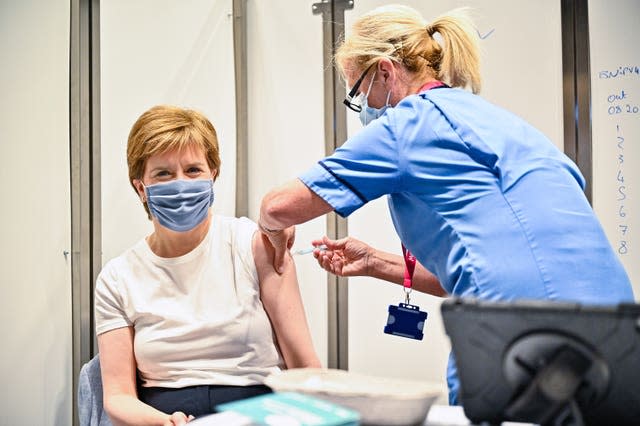Sturgeon: Spike in coronavirus cases in Scotland may be ‘past its peak’
A spike in coronavirus cases in Scotland may have passed its peak, Nicola Sturgeon has said.
The First Minister was speaking during a Covid-19 briefing called after cases of the virus surged to their highest ever level in Scotland.
While she said the rise in cases was a cause for concern, she added that early data suggests they may soon begin to fall.
“When we look at cases over the past week by the date the specimen was taken, as opposed to the date on which we report the test result, which are the numbers we report on a daily basis, then what we see is a peak in cases last Tuesday, and since then we have seen what appears to be a slowing down of the rate of increase.”

She stressed it was “early days” and the trend would be monitored over coming days.
While she said the vaccine programme had broken the link between case numbers and serious illness, she urged Scots to “keep the heid” and exercise caution and common sense.
More than 80% of new cases are now in people under the age of 44, she said.
“While we are comparing case numbers now to the situation at the start of the year, it is the case that at the start of the year, which was the last time case numbers were anywhere near the levels they are at now, we were in much a stricter lockdown,” she said.
“Far, far fewer restrictions are in force now.
“So the reality now is that without vaccination, the level of restrictions that are in place just now would undoubtedly be leading to far higher case numbers than is actually the case.
“So that’s the first sign that vaccination is actually having an effect.”
Ms Sturgeon said changes to people being admitted to hospital over coronavirus gives confidence that the vaccination programme is working.
She said: “Fewer people who get Covid-19 now need to go to hospital and a higher proportion of people who do need to go to hospital are not staying in hospital for as long.
“These two factors are obviously helping to cut down the serious illness impact of the virus, but also they are helping to protect the NHS from the full scale of the pressure that case numbers like this would have heaped on it before vaccination.
“These factors are also what continues to give us confidence that vaccination is going to get us out of this.”
On Tuesday, 3,118 cases and one death of a patient with the virus were recorded, bringing the total to number of fatalities to 7,713.
It followed 3,285 positive tests on Monday, the highest number since the start of the pandemic.
The First Minister said she was still confident that restrictions could be further eased as planned on July 19 and August 9.
But she stressed that now is a “critical moment”, urging people to stick with the coronavirus measures.

The First Minister was also asked about fans who travelled to London to watch Scotland play in the Euro 2020 tournament, and whether the Government had taken a “softly, softly” approach to this.
She said: “We haven’t taken a softly, softly approach.
“We were very explicit in saying to fans who didn’t have tickets for Wembley not to travel.”
Public Health Scotland are doing further analysis on the association between watching football and the spread of coronavirus, she said.
The First Minister was also asked about why cases had spread so rapidly in Scottish cities compared to other parts of the UK.
She said that in previous waves of the virus, Scotland had been “behind and below” the curve but it was now “slightly ahead and above”.
Aside from temporary events like football matches, this is partly down to lower levels of antibodies in the Scottish population due to lower cases earlier in the pandemic, she said.
Ms Sturgeon also said the Delta variant of Covid-19 was first seeded into Glasgow, Scotland’s largest city, potentially allowing it to spread “more quickly and extensively” – as opposed to Bolton in England which has a smaller population.


